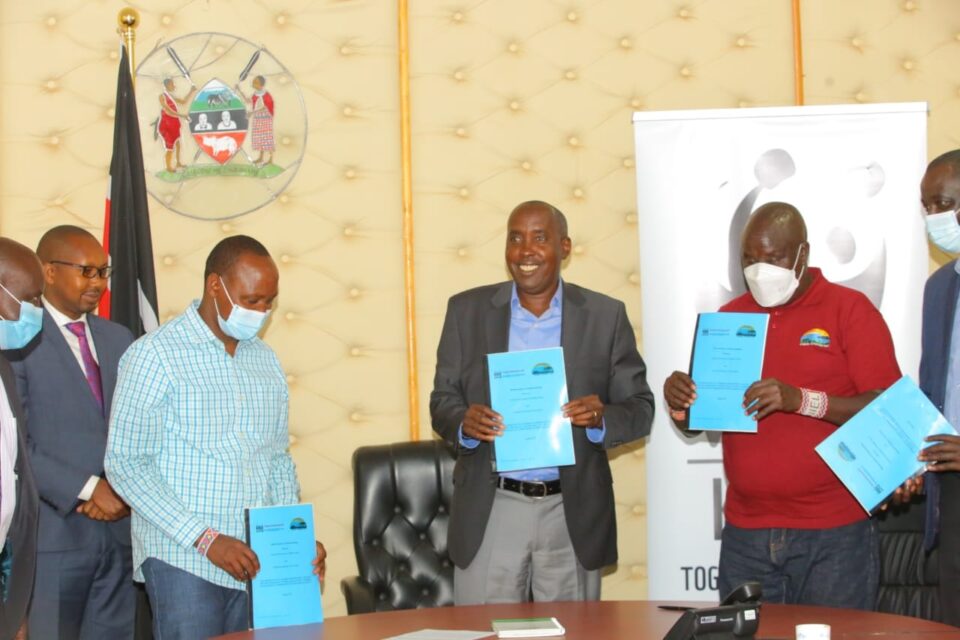Efforts to get a copy of the document were thwarted by officials under the pretext that the document was ‘confidential’, yet it concerns communal land
By Kajiado Star team
Suspicion is rife that the recent signing of a Memorandum of Understanding between the Kajiado County Government and the Amboseli Ecosystem Trust could turn out into yet another major historical land injustice in the making.
While making the announcement on his Facebook platform, Governor Joseph ole Lenku wrote: “Our partnership with stakeholders who are committed to conserve our environment and wildlife to enable our people adopt alternative sources of livelihoods and sustainable land use is a key area of our service delivery.
“Towards this end, my government has signed a Memorandum of Understanding (MoU) with the Amboseli Ecosystem Trust which, among other things, sets a mode of engagement between us and the various conservancies in the county.”
RELATED STORY
Narok BBI rally: Tata, KWS accused of oppressing the Maasai
Following the development, Kajiado Star made an effort to get hold of the document, in order to find out the terms and conditions agreed therein.
When we reached out to a senior county government official requesting a copy of the MoU, all we were told was that, “The document is confidential.”
This begs a number of questions. For one, how can a document that is bound to have some implication on ownership and/or management of land owned by the community be declared “confidential” by an office whose holder owes the position to having being elected by the same owners of the land?
What is this that the county government negotiated on behalf of the landowners and how precisely does the agreement guarantee “alternative sources of livelihoods and sustainable land use”?
Such questions notwithstanding, the county government needs to adhere to the stipulations of the constitution.
As the supreme law of the land, the constitution requires holders of public offices to conduct their businesses in an open manner and requires Parliament to facilitate public participation and involvement in decisions that pertain to their interests, if not their welfare.
Indeed, Section 118(2) asks Parliament not to “exclude the public, or any media, from any sitting unless in exceptional circumstances the relevant Speaker has determined that there are justifiable reasons for the exclusion.”
As stated elsewhere, public participation is seen as a series of actions a public officer takes to involve members of the public in affairs of governance. Besides voting, this includes involving the public in meetings, in public discussions or debate on issues the citizens hold dear, or in signing a petition on a desired government action or policy.
Citizens get such rights and power to participate directly from the Constitution. In this regard, the Kajiado county government needs to know that Kajiado residents share sovereign power with the rest of Kenyan citizens. The sovereignty of the people is articulated in Article 1 of the constitution.
Specifically, under Article 1(1-4), all sovereign power belongs to the people of Kenya and is exercised only in accordance with the constitution. It also states that the people may exercise their sovereign power either directly or through their democratically elected representatives. In Kenya, the power of the people is exercised both at the national and county levels.
In accordance with this constitutional provision, it is the duty of Governor Ole Lenku and the county government he heads to facilitate public participation.
The governor should ensure that the MoU document is accessible to the people if at all it represents their interests in land matters.
The office of the governor is also obliged to provide interpretative training to land owners on the particulars of the MoU. Indeed, it is not too much to ask of the relevant arms of the County Government to provide effective communication on such a critical issue.
Our concern is not an idle one. We have seen situations in Kenya and elsewhere in Africa where the rights of communities have been violated.
As we write this, there is a huge concern in Isiolo and other counties in upper Eastern and the North over the direct involvement of the Northern Rangelands Trust (NRT) in the decision pertaining to the management of community lands under the guise of wildlife conservation.
At the same time, Kenya has enacted a number of legislations that are against the traditional peasant farming practices such as the Crops Act No 16 of 2013 which now has made it illegal for farmers to grow their own seed.
It is even worse in countries such as Mozambique where peasants in the northern part of the country are struggling to keep their lands, after the government and foreign companies took them over to set up large-scale agribusiness projects.
Interestingly, after taking over their lands, the relevant farmers are told that such projects will be of their benefits. However, as pundits have it, the country’s experience with foreign investment in agriculture has been nothing but disastrous.
Again, it is not too much to ask of the County government to come clean and let all and sundry know the contents of the MOU.
